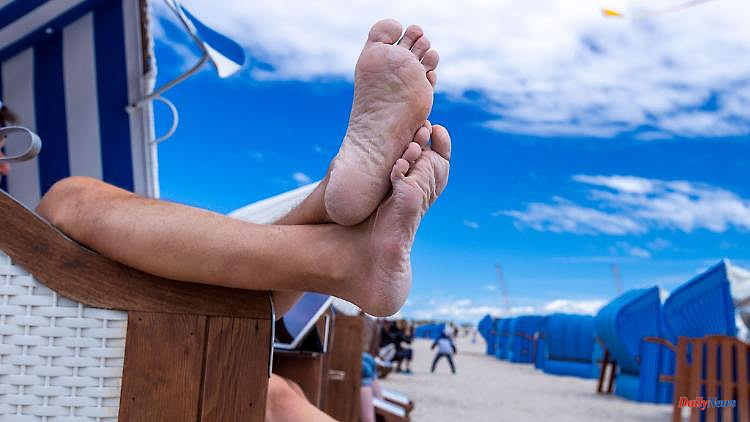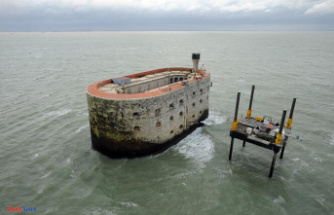A phone call from the ferry, a large ration of medicine in your luggage or a careless step on a banknote. There are many ways to get into trouble while traveling. We help you avoid it.
Always keep an eye on your wallet and passport, ignore suspiciously cheap branded goods and don't eat uncooked food in the tropics: Most travelers know the most important travel rules. But is that all?
You probably haven't thought of these eight things not to do when traveling:
1. Trust the hotel safe
Passport, money, tickets and other valuable items? Of course, they go into the hotel safe on the go, after all you don't want to lose them or please the next pickpocket.
But are they really safe? The short answer is: no. Some very old models can be opened by cutting off the power supply, others can still be opened with the factory settings, and others reveal their contents if you hit the lid with your fist.
Instructions abound online, including some weird methods that require a potato.
TÜV Rheinland also warned in 2019: Safes in hotel rooms are often only a small obstacle for thieves because they are mounted in the closet or on the wall with simple screws. Then they could be broken out by criminals and taken away.
TÜV Rheinland advised at the time that it was safer to use the hotel safe at reception. Valuables are received there in return for a receipt and are fully insured - in contrast to storage in room safes.
The conclusion? Most of the time it's fine. If you have really important things with you, you should ask the hotel again if there is no safer storage.
2. Telephone on the ship
When traveling by ferry, for example from Germany to Sweden or Norway, reaching for a smartphone does not seem to be a problem in terms of costs. After all, there have been no roaming charges in other EU countries and some other countries since 2017.
Unfortunately, this only applies to land-based networks. Since there is usually no mobile phone connection when out at sea, large ships often have an on-board mobile phone network, which in turn is connected to a satellite network.
Unfortunately, these ship networks are breathtakingly expensive and do not have automatic cost limits: a short phone call costs between three and seven euros/minute, and you can expect up to 2.50 euros per 100 kilobytes of data traffic.
For classification: A short Whatsapp film of less than a minute has a volume of around one to three megabytes. In the price example, playback costs between 25 and 75 euros.
It's hard to imagine what it costs to calm the children down with a longer YouTube film. However, there is a safe countermeasure against all this: simply switch off the smartphone or at least switch to flight mode.
3. Pack everything in your luggage
Everything you need immediately after landing definitely does not belong in your luggage. According to a report by the IT service provider Sita, airlines around the world lost around 25.4 million pieces of luggage in 2019, i.e. the last “normal” travel year before Corona, which is a little more than 5.5 suitcases per thousand passengers.
That alone is no reason for fear of loss: according to the International Association of Airline Companies (IATA), 99.5 percent of all missing luggage items turn up again. In order not to belong to the remaining 0.5 percent, one should neither leave loose straps dangling on one's luggage nor show up with an overly worn suitcase.
The so-called minimum connecting time of a transfer airport is also important. If the transfer time is shorter than the specified minimum time, it will be tight. The suitcase will probably arrive at the destination on the next flight of the airline at the earliest and then usually follows the owner by taxi or courier.
If you don't want to sit around in your underpants and with the plaque from the day before yesterday until then, you should carry a small, minimal set of equipment with you in your hand luggage.
4. Not being prepared for emergencies
Honestly, when was the last time you looked for the emergency exit in a hotel? No matter how good the sprinkler system is: If there is a fire in the hotel, you should know the way out - especially on higher floors, because fire brigade ladders don't go further than the seventh or eighth floor.
You should also know the emergency number and whether it is worth calling at all. It's like this: Only a little more than 70 countries (two thirds of them in Europe) have a country-wide rescue service that can always be reached. In all others, you often have to look for yourself how to get to the nearest hospital.
5. Allow flight routes to lapse
How can it be that a plane ticket from Oslo via Berlin to New York costs less than the same ticket from Berlin without the first leg? And do you really have to board in Oslo? Even if this is just a fictitious example: Yes, you have to.
If you let a segment of the flight ticket expire, the airline may charge you the difference to the regular route price. This is legally controversial, but in any case it causes unnecessary stress after the trip and possibly very high extra costs.
6. Not knowing the local laws
Being law-abiding while traveling is normal for most travelers. Of course you have to know that in Thailand, for example, lese majeste is severely punished. That's why you should never stop a fluttering banknote with a courageous kick - the king is depicted on the front!
In Buddhist countries, people are sometimes allergic to supposedly funny photos with Buddha statues, and on the native islands of the Maldives - those that are not part of tourist resorts - bikinis are not allowed. In Bhutan, on the other hand, smoking in public is banned, and in Singapore, transporting the musty-smelling durian fruit on the subway.
A particularly efficient way to mess with the law is with drone footage. In many countries you need a special permit. In Morocco, Iran, Kenya and Egypt, for example, they are completely banned. If you still let them fly without the right papers and still close to a military area, it can quickly become a prison stay.
7. Carelessly taking medication with you
It doesn’t matter whether it’s fear of flying, pain or states of tension: Actually, there are suitable medications for everything. But you shouldn't always take them carelessly with you when you travel.
A number of countries around the world, including the United Arab Emirates, Singapore, Malaysia and many others, have far stricter drug laws than here. What still passes as a common drug in Europe may be a ticket to prison elsewhere, even in small quantities.
Before you travel, you should inquire in good time, for example on the embassy website. A short English-language confirmation from the family doctor that the medication is necessary is also recommended.
8. Check the account balance at the hotel
This isn't a good idea at times, especially if the WiFi isn't password-protected. Because, honestly, are you absolutely sure that you have chosen the right one?
As soon as an entry like "Guest" or something similar appears in the list of available networks, most guests assume that it is the right network. It is also possible that criminals have set up their own WLAN hotspot near the hotel. In the worst case, they can track everything from e-mail log-in to bank passwords, install malware or redirect the connection to phishing sites. This method is also popular at airports and in restaurants.
A solution for more security: Use your own mobile data or VPN tunnel software instead of WLAN.
(This article was first published on Friday, May 06, 2022.)
6












